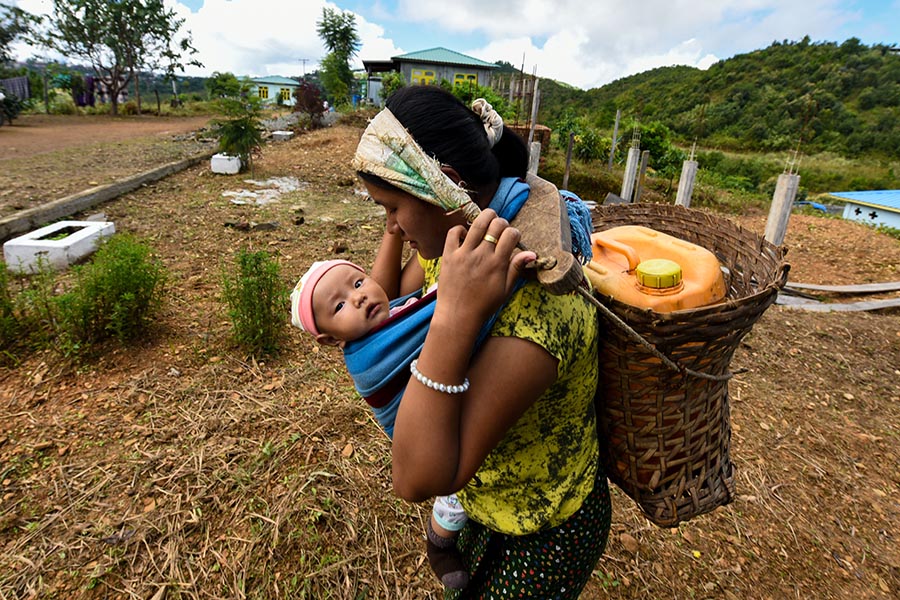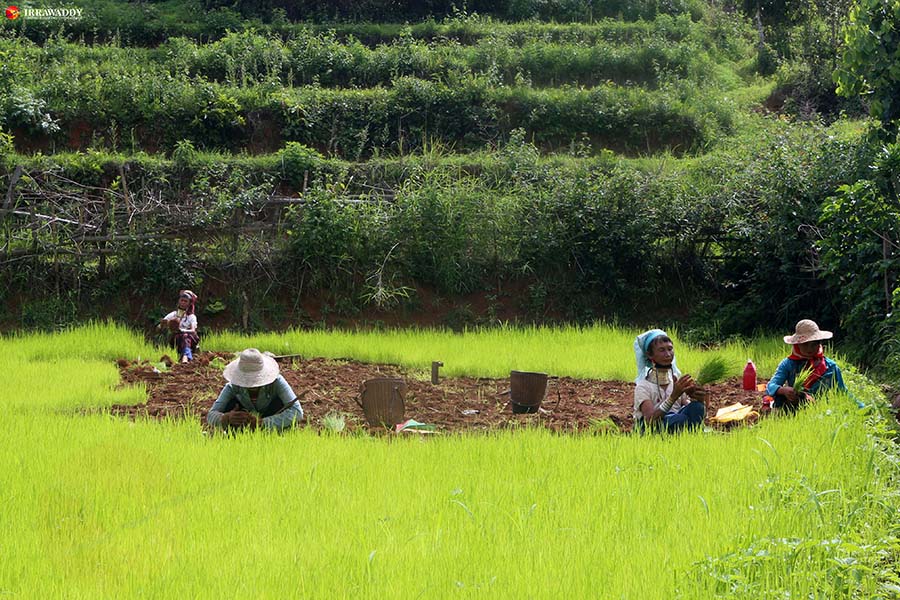YANGON – Civil society organizations (CSOs) want the rights of indigenous people to be officially recognized in Myanmar’s Nationally Determined Commitment (NDC), the government’s action plan to implement the Paris Agreement for tackling carbon emissions, in order to prevent tribal people being driven from the forest to make way for climate-change mitigation projects.
The United Nations Framework Convention on Climate Change (UNFCCC) includes a legally established rights platform for indigenous people to support the exchange of experiences and the sharing of best practices on mitigation and adaptation. It was approved as part of the Paris Agreement that was signed in December 2015 at COP 21 (the Conference of Parties).
At COP 23 — held in the German city of Bonn last month — recommendations were submitted by various groups and states on ways to implement the platform, including a strategic plan, procedures and structure. Some Myanmar civil society groups like the Chin Human Rights Organization (CHRO) and Promotion of Indigenous and Nature Together (POINT) joined the Bonn conference from Nov. 6-17.
In an interview with The Irrawaddy, Mai Thin Yu Mon, one of CHRO’s representatives in Bonn, revealed that participants exchanged views in a working group committee that provided a voice for the world’s indigenous people, as well as drafting a rulebook for every nation in the world.
“Whenever people talk about climate change, they think it’s about growing plants and increasing permanent forest estate. And then they start thinking of pulling out the people who rely on the forest, in order to grow plants and to protect the forest. As they only emphasize the forest, it destroys the livelihoods of these people,” Mai Thin Yu Mon said.
The CHRO representative has been participating in UN climate change conferences for several years and noted that the indigenous rights platform was officially recognized by the UNFCCC several years ago after participants realized that while a small number of scientists and environmentalists could monitor rising global temperature and the impacts of climate change, tackling climate change in a holistic way required the local knowledge of indigenous people.
Deforestation Rates in Myanmar
In order to reduce carbon emissions, Myanmar submitted an Intended Nationally Determined Contribution (INDC) in 2015 and filed National Determined Commitments (NDC), which outline its voluntary national targets on climate-change mitigation and adaptations in future years.
The Global Forest Resources Assessments 2015 report indicates that Myanmar’s forests cover 45 percent of its total land acreage, which was down dramatically from 60 percent 25 years earlier. Between 2010 and 2015, Myanmar’s annual deforestation rate was 1.7 percent, which translates into the loss of approximately 546,000 hectares of forest per year and ranks as “the third largest net loss of area in the world within one decade.”
The Myanmar government has announced a temporary logging ban nationwide, and a one-decade logging moratorium in the Bago Yoma Region, while round log exports have been forbidden since 2014.
As deforestation and degradation have surged, shrub and bush land across the state has proliferated as a result of increasing agriculture, the granting of large-scale industrial concessions (mainly for oil palm and rubber), timber harvesting, fuel-wood collection as well as charcoal production. Kyayah, Mon, Sagaing, Kayin and Chin states have also largely been affected by shifting cultivation, according to the Ministry of Natural Resources and Environmental Conservation (MONERC).
According to a pamphlet on Myanmar’s REDD program that was distributed at the Bonn conference, shifting cultivation remains widespread, covering at least 2-4 million hectares nationwide and probably more as monitoring on farming sites is limited.
Myanmar INDC and Indigenous Rights
The forestry master plan, or Myanmar NDC commitment, is likely to be resisted by ethnic groups who rely on shifting cultivation to sustain their communities.
In September, a confrontation occurred between local Kachin people and officials from the Ministry of Natural Resources and Environmental Conservation after the ministry announced a plan to seek World Heritage Site status for Mt Khakabo Razi in Kachin State’s Putao area. Locals are concerned about land loss in the near future.
The Myanmar NDC identifies short, medium and long-term priority actions, including forestry, as well as the promotion of biodiversity in line with the Paris Agreement. But it does not mention indigenous people’s rights, POINT program manager Hla Doi said.
POINT also provided a report which analyzed the Myanmar INDC. It says Myanmar plans a Permanent Forest Estate (PFE) under the management of MONERC and intends to expand the designation of Reserved Forests and Public Protected Forests (PPFs) to cover 30 percent and 10 percent of the country’s land area, respectively. Those goals are also mentioned in Myanmar’s 30-Year National Forestry Master Plan.
Myanmar’s REDD program estimates that the annual mitigation potential for deforestation reduction targets of 30% by 2025 and 2030 would be around 10.1 million and 16.86 million metric tons of CO2, respectively. Given the current average global CO2 price of US$5 per ton, Myanmar stands to earn around US$51 million by 2025.
“The expansion of PPE does not recognize the rights of indigenous people and local communities to their forests and restricts access to the forest resources that are essential for their livelihoods, health and cultural traditions,” the report says.

Hla Doi said, “By mentioning indigenous rights in its commitment paper [NDC], it could prevent land-grabbing and the expulsion of indigenous people who rely on the forest.”
Mai Thin Yu Mon of the CHRO also noted that many indigenous people have been living in forests for generations, and had their own traditional forest management systems long before the government started branding different areas as nature reserve forest, protected forest and national gardens of Myanmar.
Tribal groups in Myanmar have traditionally used shifting cultivation with specific timeframes, such as abandoning a cultivated place for a few years and returning to the land again when it has regenerated. Mai Thin Yu Mon urged the government to adopt local practices that could contribute to mitigation projects in practical ways.
She added that deforestation was caused mainly by mass illegal logging in regions where there was a lack of law enforcement, referring to areas contested by armed ethnic groups.
As for the government’s NDC approach, Mai Thin Yu Mon predicted, “As the areas are officially selected for reserved forests, indigenous people are going to be forced to leave and they will lose both their livelihoods and group identities.”
The Irrawaddy sought to obtain from Hla Maung Thein, the director-general of the Environmental Conservation Department and also chair of the Myanmar delegation, an official response to the criticisms made by the CSOs regarding contested areas between the government Army and ethnic armed groups. Hla Maung Thein attended COP23 in Bonn but he could not be reached for comment on Tuesday.
Pushing on the International Stage
The International Indigenous Forum for Climate Change (IIFCC), which is the collective voice of indigenous people from around the world, designed a draft statement on the issue in Canada in September. The IIFFC and CSO groups brought the draft to COP23 and discussed it with government officials in the hope of reaching an agreement an on indigenous platform as well as a detailed plan, but the outlook for such action remains bleak, especially in Asia, where governments have shown little interest in protecting the rights of such groups.
Mai Thin Yu Mon noted that it was mentioned in discussions that sometimes China strongly opposed such indigenous rights platforms, as such a global platform would clash with its existing laws. The same problem can be seen in Myanmar, where the 2008 Constitution’s provisions only mention “ethnic people” rather than “indigenous people.”
“ASEAN governments are not interested much in indigenous rights as they don’t want to change their enacted policies,” Hla Doi said.
However, some wealthy countries, especially the U.S. and those in Europe, have supported a global mechanism for indigenous people and even allowed indigenous rights specialists to join government delegations to discuss the issue.

“We hope to be recognized as an official body under the UNFCCC that can consult with the UNFCCC regarding indigenous people’s rights. Then, if Myanmar offers no way for indigenous people to join the climate action plan, we can lodge a complaint over it via the indigenous body,” said Mai Thin Yu Mon.

















